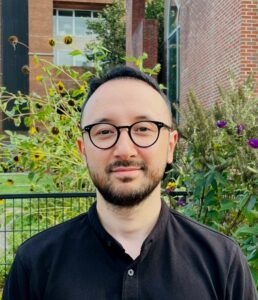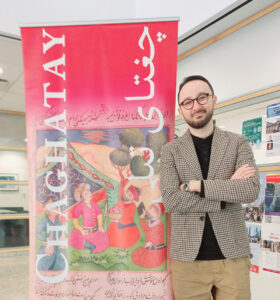 Nurlan Kabdylkhak is a Ph.D candidate in History at UNC at Chapel Hill. His research focuses mainly on the social and cultural history of Central Asia.
Nurlan Kabdylkhak is a Ph.D candidate in History at UNC at Chapel Hill. His research focuses mainly on the social and cultural history of Central Asia.
Q: Can you provide us with a short educational and professional background of yours?
A: From my earliest memories, history has always captivated me. As a child one tends to have a very romantic understanding of history. As someone who was born and raised in Kazakhstan, my love for history was ignited and shaped by tales of mighty khans and legendary historical figures of Central Asia. Whether it was the indomitable Saka Queen Tomyris defeating Cyrus the Great, the world-conquering Genghis Khan, or the last all-Qazaq sovereign, Kene-Sary, each narrative resonated with me.
It was not until my pursuit of a master’s degree in International Area Studies at Tsukuba University in Japan that I rediscovered my profound passion for Central Asian history. In the library, I stumbled upon the works of the late historian Yuri Bregel and Devin DeWeese, which revolutionized my understanding of Central Asian history. Their innovative approach to historical scholarship – creative and informed by sources in multiple languages – transformed my understanding of the field. Their contributions opened my eyes to the burgeoning realm of Islamic Central Eurasian studies. This intellectual journey ultimately led me to a pivotal decision: to pursue academic history to become a professional historian.
Q: You have been awarded the Charlotte W. Newcombe Doctoral Dissertation Fellowship for 2023, which is a very prestigious fellowship. Can you tell us about this fellowship, how did you come across it, and what is its significance for you and your work?
A: Before arriving at UNC, I curated a list of grants and fellowships to pursue during my graduate studies. The Newcombe Fellowship, in particular, captured my attention, as it is specifically designed for Ph.D. students exploring the realms of religion and ethics across diverse contexts. Given that my research focuses on the evolution and governance of religious institutions in colonial Central Asia, the Newcombe Fellowship seemed like an opportunity I should not miss.
I am honored to be among the 21 scholars selected for the Newcombe Fellowship this year. I extend my sincere gratitude to both the Charlotte W. Newcombe Foundation and The Institute for Citizens & Scholars, which administers the award, for their unwavering support and for providing me with the opportunity to devote myself entirely to my dissertation over the course of this academic year.
Q: Could you tell us a little about your dissertation project? What is it about?
A: My dissertation project delves into the dynamic social and political history of Muslim religious institutions in the colonial Kazakh steppe. In the early 19th century, this vast territory, spanning over a million square miles, housed only a few permanent mosques and a scattering of Islamic scholars. Yet, by the turn of the century, it had transformed into a vibrant hub of Islamic culture. Notably, the city of Semey alone boasted eleven mosques, nine Islamic colleges (madrasas), and a dynamic network of religious scholars (‘ulama), who fostered connections beyond regional, imperial, and ethnic boundaries, linking the steppe with Central Asia, the Volga-Urals, Qing Xinjiang, and the Ottoman Empire.
My research scrutinizes this period of profound change, often described by scholars as an Islamic transformation or Islamic revival on the Kazakh steppe. My goal is to unravel how tsarist Muslim subjects organized their communities, expressed their religious and ethnic identities, and established, financed, staffed, and defended their institutions against the backdrop of the imperial state.
An integral aspect of my work involves bringing Muslim and specifically Kazakh-language sources to light. By amplifying these voices, my research possesses the potential to reshape existing scholarly narratives, presenting a more nuanced portrayal of tsarist Muslims and their responses to the challenges and opportunities arising from Russian imperial expansion into Central Asia.
 Q: You taught some courses at UNC. Can you tell us what did you teach?
Q: You taught some courses at UNC. Can you tell us what did you teach?
A: As a teaching assistant, I had the opportunity to lead recitations for courses including “The World since 1945,” “Modern Central Asia,” and “History of Muslim Societies since 1500.” Guiding students through diverse subjects taught by different scholars proved to be an incredibly enriching experience. The exposure to various scholarly literatures, often beyond my immediate field, expanded my intellectual horizons, while working alongside UNC history professors helped me to enhance my pedagogical skills and grow as an educator. I had the fortune of collaborating with esteemed professors such as Cemil Aydin, Max Owre, Donald Raleigh, and Eren Tasar, whose mentorship imparted invaluable insights.
More recently, I taught my own course on Russian history, covering late imperial and Soviet eras. Receiving overwhelmingly positive feedback from my students in the end of the course has been gratifying, and I hope that this class met their expectations.
Q: Last year, you were outside the US for a research leave. Can you share with us some of your research and travel experiences?
A: To gather materials for my dissertation research, I travelled to archival institutions in Russia and Kazakhstan. My initial destinations were Kazan and Ufa, pivotal centers of tsarist-era Islamic learning and governance. There, I delved into Muslim manuscripts, periodicals, and the records of the tsarist Muslim Spiritual Assembly, which oversaw the legal and religious matters of Muslims in Imperial Russia.
Afterward, I continued my research in St. Petersburg at the Russian State Historical Archive (RGIA). My primary focus at RGIA was on the documentation of the tsarist Ministry of Internal Affairs, particularly its Department of Spiritual Affairs of Foreign Confessions—the supreme imperial authority managing the religious affairs of Russia’s diverse non-Orthodox communities. Finally, in Kazakhstan, my research was concentrated at the Central State Archive (Ortalıq Memlekettik Arkhiv), where I studied numerous documents that shed light on the evolution and governance of Islamic institutions across the Kazakh steppe.
Q: What would you advise for the prospective fellowship applicants?
A: It may not seem like a particularly original piece of advice, but starting the preparation of your application well before the deadline is essential. This approach allows you to craft multiple drafts of your application until it represents your qualifications and intentions most effectively. It’s also crucial to have your friends and colleagues review your materials. Being an expert in your field, you may easily overlook certain details that have become second nature to you. By sharing your application with others, you can gain insights that will help you clarify and expand upon aspects that may be ambiguous to fellowship committees. Ultimately, the goal is to present a clear and compelling narrative to your prospective readers, avoiding any potential confusion.
-Burak Bulkan
